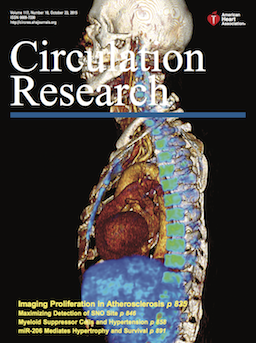Cardiovascular Program
 The Cardiovascular and Metabolic Program aims at advancing the knowledge of prevalent cardiovascular and metabolic diseases and accelerating the development of new therapeutic and diagnostic strategies. The program brings together scientists from multiple communities within MGH and Harvard. Collectively, the projects described below undertake a variety of systems-level analyses, including systematic mapping of genetic/functional interactions, functional genomics, and in vivo molecular imaging.
The Cardiovascular and Metabolic Program aims at advancing the knowledge of prevalent cardiovascular and metabolic diseases and accelerating the development of new therapeutic and diagnostic strategies. The program brings together scientists from multiple communities within MGH and Harvard. Collectively, the projects described below undertake a variety of systems-level analyses, including systematic mapping of genetic/functional interactions, functional genomics, and in vivo molecular imaging.
- NHLBI
- NIAID
Research Projects
Atherosclerosis/Myocardial infarction
- Exploring the role of inflammatory networks in ischemic heart disease and stroke
- Major focus on monocyte/macrophage subsets, their function and ontogeny
- Chemical biology and genomic studies to assign function to susceptibility alleles for atherosclerosis or myocardial infarction
- Nanomaterial-based molecular imaging probes to define cellular and enzymatic components of plaque, and monitor disease progression and therapeutic response in pre-clinical studies and clinical trials
Metabolism and energetics
- Systematic mapping of metabolic pathways in health and disease using mass spectrometry-based metabolomics and proteomics
- Translational research in metabolic syndrome
- Functional genomics of mitochondrial function in diabetes and other human diseasess
Stem cells and regeneration
- Role of hematopoietic stem cells in ischemic heart disease and stroke
- Small molecule approaches to direct differentiation of stem cells into the cardiac lineage
- Chemical screens in stem cells or model organisms to dissect developmental pathways and manipulate them for therapeutic benefit
- Nanoparticle-based imaging of transplanted stem cells in vivo
Novel biomarkers for diagnosis, clinical phenotyping and disease status
- Metabolites
- Cell-based phenotypes
- Nanoparticle-based molecular imaging
- Benchtop parallel measurement of multiplexed analytes
Recent Publications
Jang HJ, Kim J, Kim H, Kim T, Chung J, Cremer S, Krohn-Grimberghe M, Kim EJ, Schellingerhout D, Nahrendorf M, Kim DE
Inhibiting Monocyte Migration Reduces Arterial Thrombosis and Facilitates Thrombolysis. Stroke. 2025;56(12):3438-3453 - PMID: 41070446 - PMCID: PMC12636086 - DOI: 10.1161/STROKEAHA.125.052352Yamazoe M, Ting KKY, Lee IH, Bapat A, Lewis A, Xiao L, Pulous FE, Mentkowski K, Paccalet A, Momin N, Seung H, Dolejsi T, Kumowski N, Schloss MJ, Iwamoto Y, Ramos G, Chan K, Antoniades C, Casadei B, Swirski FK, Ellinor PT, Naxerova K, Pabel S, Hulsmans M, Nahrendorf M
B cells promote atrial fibrillation via autoantibodies. Nat Cardiovasc Res. 2025;4(10):1381-1396 - PMID: 41062615 - PMCID: PMC12520985 - DOI: 10.1038/s44161-025-00724-zKhetarpal SA, Li H, Vitale T, Rhee J, Challa S, Castro C, Pabel S, Sun Y, Liu J, Bogoslavski D, Vargas-Castillo A, Smythers AL, Blackmore KA, Grauvogel L, Mittenbühler MJ, Khandekar MJ, Curtin C, Narvaez-Paliza JM, Wang C, Houstis NE, Sprenger HG, Jurgens SJ, Biddinger KJ, Kuznetsov A, Freeman R, Ellinor PT, Nahrendorf M, Paulo JA, Gygi SP, Dumesic PA, Asnani A, Aragam KG, Puigserver P, Roh JD, Spiegelman BM, Rosenzweig A
Cardiac adaptation to endurance exercise training requires suppression of GDF15 via PGC-1α. Nat Cardiovasc Res. 2025;4(10):1277-1294 - PMID: 40993371 - DOI: 10.1038/s44161-025-00712-3Nahrendorf M, Robbins C
Macrophage Mayhem in Aortic Aneurysm. JACC Basic Transl Sci. 2025;10(12):101432 - PMID: 41432338 - PMCID: PMC12861633 - DOI: 10.1016/j.jacbts.2025.101432- More publications ...
News
The American College of Cardiology announced today the appointment of Matthias Nahrendorf, MD, PhD, as the new Editor-in-Chief of JACC: Basic to Translational Science.
The exercise manuscript by Frodermann and Rohde (Nahrendorf Lab) received the 2020 MGH Martin Prize in Clinical Research. Bottom line: get your recommended 150 min of exercise per week!
Nahrendorf lab alumni Hendrik Sager was appointed as associate professor and deputy-head of cardiology at the Technical University Munich. Congratulations Hendrik!
Swirski and Nahrendorf labs at the 2019 Atherosclerosis Gordon Conference
"Leaders In Cardiovascular Science" - Circulation Research profiles Fil Swirski. (pdf)